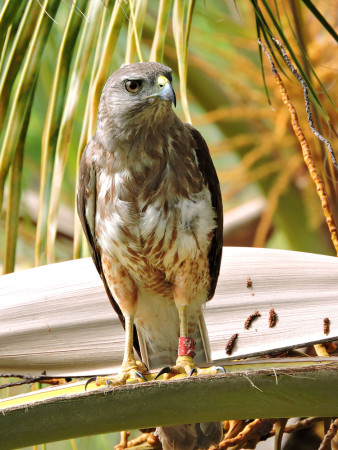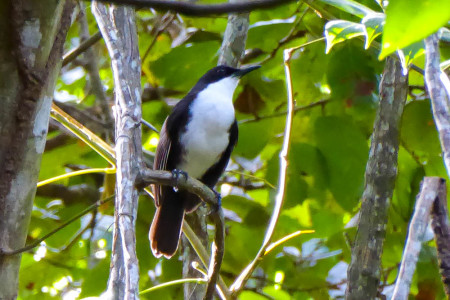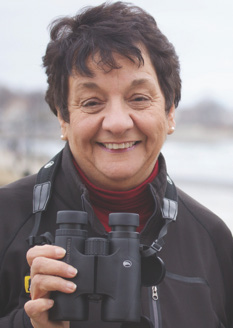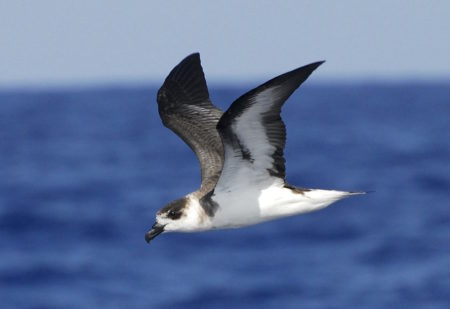BirdsCaribbean is excited to announce the first recipients of grants from the Betty Petersen Conservation Fund. Three excellent projects focusing on endangered birds endemic to the Caribbean were selected among many deserving proposals. Projects in Haiti, the Dominican Republic, and St. Lucia were granted over $132,000 through the fund, with commitments of an additional $114,000 for the second year of these projects.
The organizations to receive 2019 Betty Petersen Conservation Fund grants from BirdsCaribbean are:
- Environmental Protection in the Caribbean (EPIC) for “Black-capped Petrel Conservation Through Poverty Alleviation in a Haitian Community”
- Durrell Wildlife Conservation Trust for “Engaging Local Communities in Reversing the Decline of the Endangered White-breasted Thrasher by Restoring Key Nesting Sites and Reducing the Impacts of Invasive Species”
- The Peregrine Fund for “A Holistic Approach to the Conservation of Critically Endangered Ridgway’s Hawk in Dominican Republic”
The “Betty Fund” was created to support conservation projects in the Caribbean that engage and empower communities and stakeholders to both protect and sustainably benefit from their birds. This approach was used successfully by the woman in whose memory the Betty Fund is named.
Difficult decisions after a tremendous response to call for proposals

“We received 24 pre-proposals representing extremely important conservation work in 16 island nations. We invited full proposals from six organizations, and while virtually all of these were deserving, we had to narrow these down to three projects,” said Andrew Dobson, Chair of BirdsCaribbean’s board and a member of the Betty Fund’s review committee. “It was a very difficult choice.”
BirdsCaribbean commends all the other applicants on their proposals and encourages re-application to the Betty Fund in the future as well as continued engagement in the BirdsCaribbean network as an aid to finding other sources of funding.
The 2019 Betty Fund projects all exemplify the principle that conservation is a social undertaking, and in each human empowerment and benefits are explicitly addressed. Project approaches include establishing tree nurseries with local schools in St. Lucia to help the White-breasted Thrasher, training in sustainable agricultural practices and sponsoring a soccer team in Haiti with the local name, Diablotin, of the Black-capped Petrel in Haiti, and providing hawk-proof chicken coops to farmers in the Dominican Republic to reduce shooting of the Ridgway’s Hawk.
Additionally, all three of the selected projects focus on an Endangered or Critically Endangered species endemic to the Caribbean. “Species endemism is not a requirement for support from the Betty Fund” explained Dr. Lisa Sorenson, Executive Director of BirdsCaribbean, “but it’s gratifying to be able to direct these inaugural funds towards birds that are uniquely Caribbean.”
2019 Betty Fund Grant Recipients
Black-capped Petrel Conservation Through Poverty Alleviation in a Haitian Community
Environmental Protection in the Caribbean (EPIC)
The stories of the petrel and the people of Haiti run parallel – stories of hanging on in the face of hardship and a tenuous future in the face of great challenge; but stories also of resilience and hope based on local and international commitment to improving the environment and lives of people. The short film, “Haiti, Our Love, Our Home” portrays these stories. With dedicated funding for two years, EPIC will be able to continue and enhance activities to alleviate poverty and increase the ecological sustainability of agricultural practices, increase awareness, and foster stewardship of the Black-capped Petrel through education and outreach events. To assess the connections between their conservation efforts and local petrel populations they will map and monitor local petrel breeding habitat as well as track petrel breeding success in petrel nesting colonies adjacent to the project site.
Engaging Local Communities in Reversing the Decline of the Endangered White-breasted Thrasher by Restoring Key Nesting Sites and Reducing the Impacts of Invasive Species
Durrell Wildlife Conservation Trust

The goal of this project is to reverse the decline of the endangered White-breasted Thrasher found in Saint Lucia. Degradation of the thrasher’s dry-forest habitat, caused by unsustainable land use by local communities, and predation from invasive species are having negative impacts on the reproductive success of this small population. The team aims to increase the area of suitable habitat by working with local communities and land owners to develop a cooperative land management system promoting the protection of key nesting sites and sustainable land use practices as well as restoring the habitat through a program of planting. To reduce the impacts of invasive species, a control program will be designed and implemented across key nesting sites and the effects on nesting success will be monitored using a network of camera traps. They will also engage local school children to aid with the analysis of the camera trap footage through a local outreach campaign.
A Holistic Approach to the Conservation of Critically Endangered Ridgway’s Hawk in Dominican Republic
The Peregrine Fund
Ridgway’s Hawk is a critically endangered island endemic limited to one small, isolated population in the Dominican Republic, making it particularly vulnerable to extinction if human and natural pressures continue. The main threats are human persecution, infestation of botflies (Philornis pici) in nestlings, and habitat loss. Though the situation is dire, it is also hopeful. The Peregrine Fund has proven that most anthropogenic threats can be mitigated through environmental education and community engagement. They have developed an effective treatment protocol for Philornis infestations which has increased nestling survival by over 170%. Additionally, they have had great success with reintroductions in Punta Cana, where they released young hawks to create an additional population, which now numbers 18 pairs. The current goal is to create 1-2 more populations in Dominican Republic. Future successes will be measured by the number of hawks in each population, reduction of human-caused hawk mortality, and the advancement of local biologists to take on higher responsibilities.
About Betty Petersen and The Betty Fund

Betty Petersen (1943-2013), a lifelong resident of Massachusetts, was for many years director of a program called Birders Exchange (run by the American Birding Association), enabling birders in the US and Canada to provide resources to Latin American and Caribbean groups and individuals. In doing so, she created a network of friends and partners across all of the Americas, who loved and admired her deeply, as is evidenced by their generosity in supporting this project in her memory. The Betty Petersen Conservation Fund has been established, under BirdsCaribbean’s administration, by friends and family to keep her vision and dreams alive.
The Betty Fund was officially launched in 2018 from the generous donations of individuals who knew Betty Petersen personally or were inspired by her work. “I knew Betty for almost 30 years,” said BirdsCaribbean Board member, Charles Duncan. “She was, in her own way, a wizard. With nothing more than donated birding equipment, books, and a bit of cash, She turned local communities and school kids into committed conservationists, struggling NGOs into recognized players on the inter-American scene, and “paper parks” into real protected areas. And in the process she reminded us how rewarding it is to lend a hand when none is expected.”
Betty’s husband, Wayne Petersen, spoke on behalf of the family stating, ““Betty was neither a trained scientist nor an ornithologist. However she was a deeply caring, kind, and gentle soul who understood people, their needs, and their feelings. It was these attributes that made her sustained efforts on behalf of bird conservation in Latin America and the Caribbean so successful and what eventually made her a beloved, admired, and respected figure. I know that Betty would have been modestly overwhelmed by the way BirdsCaribbean is carrying forward her legacy – a legacy of which I am deeply proud.”

BirdsCaribbean will continue to fundraise for the Betty Fund, especially given the commitment for year two funding for the three inaugural projects. Dr. Sorenson said, “The recipients have committed to raise almost $275,000 in matching funds for their projects so, in just the first two years of its existence, the Betty Petersen Fund will have enabled more than a half-million dollars for conservation of endemic birds in the Caribbean. We are off to a great start, and we can’t wait to see what other projects we can fund in the ensuing years.”
“What wonderful news!” commented Adam Brown of EPIC, a recipient of funding for his work on the endangered Black-capped Petrel in Haiti. “Thank you to you and the Committee for allowing us this opportunity. We look forward to promoting petrel conservation the way Betty would have been happy to support.”
For information on how to contribute to the Betty Fund and/or how to apply for funding please visit our page here. Thank you to all the generous donors for making this work possible!

One comment
Comments are closed.